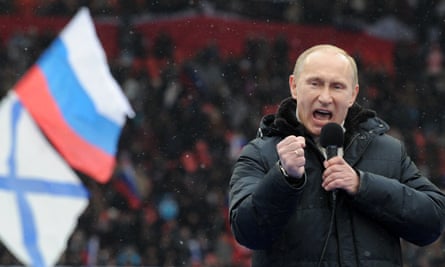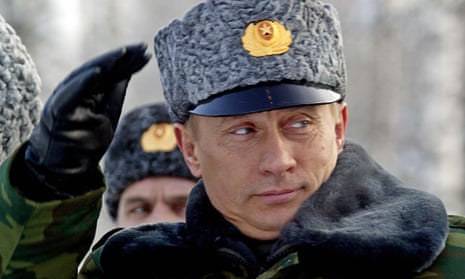In his speech on the night of the invasion of Ukraine on 24 February, which Philip Short describes as “pulsating with anger and resentment” at 30 years of Russian humiliation, Putin seethed: “They deceived us… they duped us like a con artist… the whole so-called western bloc, formed by the United States in its own image is… an empire of lies.” For those who dismiss the speech and the invasion that followed as the words and actions of a man gone mad, dying or out of contact with reality due to Covid isolation, this new biography should be compulsory reading.
As Short observes, however authoritarian and corrupt modern Russia may be, “national leaders invariably reflect the society from which they come, no matter how unpalatable that thought may be to the citizens”. While his people may have been as surprised as the rest of the world at the timing, the invasion hardly came out of the blue and many Russians, not all blinded by propaganda, support it. For as the foreign minister, Sergei Lavrov, commented a couple of weeks later: “This is not actually, or at least primarily… about Ukraine. It reflects the battle over what the world order will look like. Will it be a world in which the west will lead everyone with impunity and without question?”
Refreshingly, Short, in this meticulous biography of a man portrayed elsewhere as a 21st-century monster, refuses to moralise, opting instead to lay out how Putin’s recent actions can be seen as the consequence of the 30 years since the collapse of the Soviet Union. The former BBC correspondent is at his best when pushing us to see the world from a Russian perspective. The importance of this is neatly illustrated in the publisher’s own claims for the book: “What forces and experiences shaped him [Putin]? What led him to challenge the American-led world order that has kept the peace since the end of the cold war?” Short relentlessly traces the journey Putin has taken in rejecting that “peace”, the Pax Americana, the unipolar world in which, according to Russia expert Strobe Talbott, then US deputy secretary of state, “the US was acting as though it had the right to impose its view on the world”. From Moscow, Putin watched the US openly intervene in elections whenever it chose, encourage the break-up of the sovereign state of Serbia using bombs, invade Iraq on a tissue of falsehoods and then overthrow Libya’s Muammar Gaddafi without any UN resolution. As Putin commented in one of his acid asides that pepper Short’s account, when it came to concocting fables “those of us in the KGB were children compared to American politicians”. No wonder Xi Jinping of China and much of the world demur at the west’s claim to have done nothing to provoke the nightmare that has descended on Ukraine.
For all his recent whitewashing of Stalinism and Soviet history, in the early 1990s Putin understood the 1917 revolution had taken the country to an economic and political dead end. In his words, “the only thing they had to keep the country within common borders was barbed wire. And as soon as this barbed wire was removed, the country fell apart.” Yet running through all Putin’s thinking was a clear belief that the break-up of the Union in 1991 was a catastrophe for Russia; what was lost was not the Soviet dream but a country that physically stretched from Poland to the Pacific and historically back to Peter the Great and before. Putin mourned: “It was precisely those people in December 1917 who laid a time bomb under this edifice… which was called Russia… they endowed these territories with governments and parliaments. And now we have what we have.” Except we do not. For Putin and many of his fellow Russians have never understood how a country they believe saved the world from fascism at staggering personal cost just 50 years before dissolved in a matter of weeks.

Strikingly, the occasions Short records when outsiders have witnessed Putin’s inscrutable mask fracture nearly all relate to these “lost” lands, countries whose independent existence was to him an impossible outrage. There is the rant about Estonia to the British ambassador or former French president Nicolas Sarkozy’s magnificent record of Putin’s “violent diatribe” over Georgia and its leader, who should be “hung by his balls”. That only ended when Sarkozy retorted: “So your dream is to end up like Bush, detested by two-thirds of the planet?” Putin burst out laughing. “You scored a point there.” Finally, most importantly, over Ukraine, which, whisper it quietly, in its present shape truly was a creation of Stalin and Khrushchev. The tragedy may be that it has taken Putin’s actions, the atrocities committed by the Russian army and tens of thousands of deaths, to finally prove Ukraine’s existence to the man himself.
Critics point to Putin’s work for the KGB as revealing the core of the man, as so often investing its members with inhuman powers of control, deception, amorality and evil. Short, instead, places the real shaping of the man both before and after his KGB years. Born in the harsh courtyards of postwar Leningrad, he emerged a cautious operator, shy and unreadable, but with a startling streak of brutality. Working for the city’s famously liberal mayor through the whirlwind of chaos and violence that swept his city and Russia in the early 1990s, he forged lasting bonds with everyone from the new business elite to leading mafia bosses and senior players in the Kremlin. He labelled himself a bureaucrat, not a politician. Avoiding conspicuous consumption and not known for swimming in the oceans of corruption around him, he was at the same time not above buying himself a dissertation towards a Candidate of Sciences degree, whose subject was “Strategic Planning for the Rehabilitation of the Mineral Resources Base in the Leningrad Oblast”. Its true author, according to Short, would later receive “several hundred million dollars’ worth of shares”. Loyalty is a trademark and his friends have done very, very well over the years, as the puritan has spectacularly lost his inhibitions. His subsequent rise was public yet shadowy, a sequence of well-chosen battles engaged when he knew he could win.
Ironies haunt the book: “Those who believe that [military force] is the most efficient instrument of foreign policy in the modern world will fail again and again… One cannot behave in the world like a Roman emperor,” he said after one US military adventure. Equally haunting are the lost opportunities to avoid rubbing a proud nation’s nose in their defeat at every turn: expanding Nato to Russia’s very borders, breaking at the very least the spirit of clear promises; or not taking seriously Putin’s coherent attempt to create a joint front against radical Islam after 9/11, when he defied his own military’s cold war warriors to help Bush. Torture in Chechnya, it seems, can never be the same as torture in Guantánamo or Abu Ghraib to the victors. “We won, they didn’t,” trumped Bush senior in 1991; Clinton said “Yeltsin could eat his spinach”, while Obama more recently dismissed Russia as simply a “regional” power.
Short is too astute to indulge in easy post-event speculation about different outcomes. Instead, he charts the inexorable march away from the genuine more liberal aspirations of Putin’s early days to the harsh autocratic isolated tsar of recent years, from a Russia culturally and mentally in Putin’s words “an inalienable part of Europe” to the present rupture, which will surely separate it for at least a generation. Who remembers that Putin asked the BBC’s Bridget Kendall to moderate the first of his annual phone-ins to speak to the nation and the world? Now, he talks of the end of the “so-called liberal idea” while promoting traditional Russian spiritual values, the collective over the individual, rejecting the west in tones redolent of Soviet propaganda. But will a younger generation who have grown up feeding on internet social media, able to travel freely and getting information how and when they like, really admire an authoritarian regime that is rotten to its core? That was the challenge laid down by the anti-corruption campaigner, Alexei Navalny, and he had to be locked away. Can the ageing tsar, whose acolytes still seem keen to educate their offspring in Britain and the US when not out sailing on ever-larger yachts, really believe himself a persuasive model for those ancient values?
There is a blank evenness to Short’s prose, a steady accumulation of information built through intelligence and concentration on detail with emotions coiled tight, which makes this book a perfect mirror to its subject. He calls Putin a liar, regularly, but again and again he pulls back from laying direct responsibility on him for some of the more egregious acts. “Hard to judge” or “Nothing concrete suggests” and other such qualifiers litter his accounts of critical moments. Sometimes, they usefully temper the more extreme personal charges against Putin. Overall, however, they let him escape true responsibility, not for individual crimes, but for failing to transform Russia, instead reaching back to an arthritic mythical past, not forward to a different future.
The result is a step-by-step journey, whose penultimate chapter is a little surprisingly called “The Endgame”, hobbled by being published as the climax approaches, not after the event. Short, let alone history, has not had time to judge the success or failure of the latest horrifying act in Putin’s astonishing drive to make Russia great again.
Film-maker Angus Macqueen has helped create a platform of award-winning documentaries, Russia On Film
Putin: His Life and Times by Philip Short is published by Bodley Head (£30). To support the Guardian and Observer order your copy at guardianbookshop.com. Delivery charges may apply
